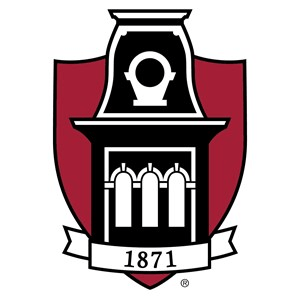University Core Requirements
The University of Arkansas has adopted a “State Minimum Core” of 35 semester-credit-hours of general education courses that are required of all baccalaureate degree candidates. This is in compliance with Arkansas Act 98 of 1989 and the subsequent action of the Arkansas State Board of Higher Education. Since 1991, all state institutions of higher education in Arkansas have had a 35-hour minimum core requirement with specified hours in each of seven academic areas in the table below. The university has identified those courses that meet the minimum requirement, and they are listed in the chart below.
Students should consult the requirements for specific colleges and programs when choosing courses for use in the University Core.
State Minimum Core
| * |
Some students majoring in math, engineering, science and business may be required to take a higher math as part of the State Minimum Core. |
| ** |
Some students majoring in math, engineering, science, education and health-related |
| *** |
Numbered at the 2000 level. See Department of World Languages, Literatures and Cultures in the J. William Fulbright College of Arts and Sciences chapter. |
| **** |
If not selected to meet the three hours of the U.S. History requirement. |
Rationale for U of A General Education Core
In order to prepare its students for lives of the highest individual quality and the greatest potential contribution to the making of a better world, the University of Arkansas has developed a comprehensive program of general education. Although the basic skills, knowledge, methodologies, and judgments derived from experience in the core area set forth here may provide the basis for a major or professional concentration, the aims of these core requirements are not career specific. Rather, the following areas are designed to develop the tools for critical thinking and effective communication, an understanding of our richly diverse human heritage, the flexibility to adapt successfully to a rapidly changing world, a capacity for lifelong learning, and an enthusiasm for creativity.
English/Communication (6 hours)
Courses offered in this area are designed to develop the ability to organize ideas and to communicate them in grammatically correct written English with clarity, precision, and syntactical maturity. Freshman English courses taken at other universities will satisfy this requirement only if they are courses in composition. Students whose ACT scores in English are 18 or below must enroll in the sequence of courses ENGL 0002, ENGL 1013, and ENGL 1023. Students whose ACT scores in English are between 19 and 27 should enroll in ENGL 1013 and ENGL 1023. Students with English ACT scores of 28 or above may enroll in Honors English (ENGL 1013H and ENGL 1023H) or regular English (ENGL 1013and ENGL 1023). Students with English ACT scores of 30 or above may take ENGL 1013H and ENGL 1023H or elect exemption. Some programs require credit in composition, and students should confer with their advisers before choosing exemption.
Fine Arts/Humanities (6 hours)
Courses presented in this area are drawn from the study of human thought, emotion, values, culture, and aesthetics. They are designed to develop the capacity for reflection, an appreciation of our own diverse culture and a tolerance of those foreign to us, and a heightened aesthetic and ethical sensibility. The courses are not performance-based, but offer students a basis for the gradual acquisition of broad cultural literacy.
Mathematics (3 hours)
Courses offered in this area are designed to develop the student’s ability to understand the diverse mathematical concepts that shape our increasingly technical culture. Core mathematics courses presuppose the ability to apply mathematical techniques at the level of high school algebra and geometry. The specific course(s) selected will depend upon each student’s curriculum, but no course below college algebra may be used to fulfill core requirements.
Science (8 hours)
A primary goal of these courses is to develop an appreciation of the basic principles that govern natural phenomena and the role of experiment and observation in revealing these principles. Students should acquire an understanding of the relationship between hypothesis, experiment, and theory, and develop the skills common to scientific inquiry, including the ability to frame hypotheses and defend conclusions based on the analysis of data. These courses are designed to prepare a student for informed citizenship by illustrating the importance of science and technology to the present and future quality of life and the ethical questions raised by scientific and technological advances.
Social Science (9 hours)
The purpose of the social science core is to introduce students to the breadth of inquiry in the social sciences—such as the study of ideas, the behavior of individuals, groups, institutions, and their interactions. The core should expose students to the history of and the challenges encountered in our complex, culturally diverse world.
American History and Civil Government (3 hours)
Under Arkansas law, no undergraduate degree may be granted to any student who has not passed a college course in American history and civil government. Courses offered by the University of Arkansas, any one of which will meet this requirement, are HIST 2003, HIST 2013, and PLSC 2003.
Office
Contact Us
Phone: 479-575-5002
Fax: 479-575-2200
Email: parents@uark.edu
Hours of Operation
8:00am – 5:00pm
